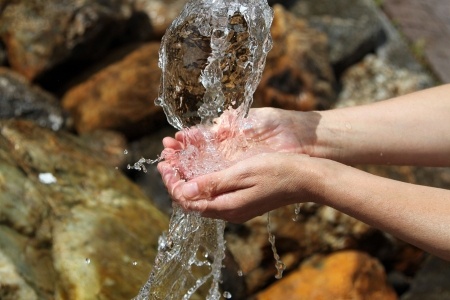Hunger and Thirst
Written by Andrea West
 Many of us in the United States take food and water for granted. Does this time of ease in our nation cause us to miss valuable spiritual lessons?
Many of us in the United States take food and water for granted. Does this time of ease in our nation cause us to miss valuable spiritual lessons?
Food and water are essential for life. Every living organism needs water to survive. Likewise, food is an absolute requirement to sustain physical life. But, though it is required for our survival, most people do not grow their own food these days.
It was not always this way in our nation.
Life on the farm
Toward the end of World War II, my family moved onto my grandfather’s 160-acre homestead in southeastern Oklahoma. At that time only rough wagon roads existed in our little valley. Electric lines had not yet come to this part of rural Oklahoma. But we had enough acreage to plant a large garden, along with fields to grow corn and hay for the livestock.
We also had a hand-dug well for water. It was about 4 feet across and 20 feet deep. There were two springs of water that flowed into our well. When we drew water out of it, you could see the water rushing back in to replenish what was taken out. Our water was sweet and cold!
Because we had a good source of water and a place to grow food, we could survive. To have food and water required that we put seeds in the ground and that we draw water from our well.
We had to actively go to “the source” in our effort to live.
Spiritual hunger and thirst
Just as we need food and water to sustain our physical life, we are created by God to need more than the physical. There is a yearning in us for more than this physical life can afford.
Ecclesiastes 3:11 speaks of this: “Also He has put eternity in their hearts.”
Commentator Albert Barnes explains, “God has placed in the inborn constitution of man the capability of conceiving of eternity, the struggle to apprehend the everlasting, the longing after an eternal life” (Barnes’ Notes on Ecclesiastes 3:11).
God uses the physical to reveal the spiritual
God created us as physical beings that must have food and water to live. He uses these absolute physical needs to speak to us of our absolute spiritual needs:
- “Ho! Everyone who thirsts, come to the waters; and you who have no money, come, buy and eat. … Why do you spend money for what is not bread, and your wages for what does not satisfy? Listen carefully to Me, and eat what is good, and let your soul delight itself in abundance” (Isaiah 55:1-2).
- “Has a nation changed its gods, which are not gods? But My people have changed their Glory for what does not profit. … For My people have committed two evils: They have forsaken Me, the fountain of living waters, and hewn for themselves cisterns—broken cisterns that can hold no water” (Jeremiah 2:11-13).
- “Blessed are those who hunger and thirst for righteousness, for they shall be filled” (Matthew 5:6).
- “And Jesus said to them, ‘I am the bread of life. He who comes to Me shall never hunger, and he who believes in Me shall never thirst’” (John 6:35).
Two lessons from rural life
- Our well held life-sustaining water, but we had to go to that source several times throughout the day to draw water to quench our thirst. Go to God in prayer often throughout the day. He is the Source of righteousness and peace that we so desperately need.
- When we dug into the soil and planted seeds, life-giving plants grew up to nourish our bodies. Dig into the Bible on a daily basis. God placed in this book the way to everlasting life. His words will nourish us and teach us how to live.
Andrea West lives in Lewisville, Texas, with her husband, Roger. They attend the Fort Worth, Texas, congregation of the Church of God, a Worldwide Association.










